X-RAY RUNS: Apply for Beamtime
2017 Nov 1 - Dec 21
2018 Feb 7 - Apr 3
2018 Proposal/BTR deadline: 12/1/17
2018 Apr 11 - Jun 4
2018 Proposal/BTR deadline: 2/1/18
 |
| Issue No. 3 | 2014.02.17 |
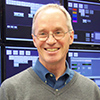 |
From the Director
Things have been very busy around the lab. During the winter "down" period, we tested in CESR a full-size prototype of the A/G-line small gap undulator vacuum chamber. Based on these tests, our hardware designs are sound and we can begin fabricating the final assemblies for permanent installation during the summer down. We're now looking forward to resuming user operations on February 19th and giving users access to several of our new detectors and the upgraded F2 station optics (50x increase in flux at high energies!). I'd like to bring to your attention the eNews items featuring CHESS user Hiroaki Sai, the new double-Laue monochromator at F2, and the Young Investigator Seminar. These items highlight one of our users, a major upgrade led by a research associate, and a new seminar series created by and for grad students and post-docs. CHESS is very proud of its legacy of training both expert users and x-ray beamline scientists. |
|
X-RAY RUN SCHEDULE: (apply for beamtime) |
 |
Postdoctoral position available with MacCHESS Applicants should have a Ph.D. degree in structural biology, biophysics, or a related field. Experience in hands-on development of sample-handling methods is desirable, and experience working at a synchrotron source is a plus. more » |
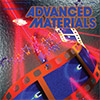 |
Add a little something ... Additives control the structural evolution in small-molecule organic solar cells. Spin coating is a standard technique, commonly used to prepare organic thin films from a solution. In order to achieve high-performance optoelectronic devices, such as solar cells based on spin-coated organic semiconductors, there is a need to control the structure ... more » |
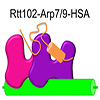 |
The role of subunit Rtt102 in SWI/SNF remodelers Each cell contains a copy of one's genome encoded in the form of a double-stranded DNA molecule. If laid out in a linear fashion, it would reach several feet in length. Eukaryotic cells have found a nifty way of compacting this long strand into a more manageable size so that a cell can easily contain it ... more » |
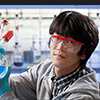 |
Cornell University portraits: Hiroaki Sai Hiroki Sai, graduate student (now post-doctoral associate) with Uli Wiesner in the Materials Science and Engineering department at Cornell, has been collecting data at CHESS since 2008 and had his Ph.D. thesis work recently highlighted by CHESS and Cornell. Read the latest Cornell portrait of this "extraordinary individual". more » |
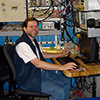 |
Detlef Smilgies appointed Adjunct Professor at Cornell Chemical Engineering Over the next three year period Smilgies will supervise projects for CBE masters of engineering students as well as work closely with faculty and students, to counsel them in the use of x-ray scattering methods for their research. In addition he will work with CBE faculty ... more » |
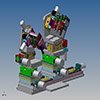 |
Double-Laue monochromator at F2 In the summer of 2013, a new double-Laue monochromator for high-energy X-rays was installed in the F-cave. The monochromator consists of benders (for sagittal focusing), tilt stages (for diffraction angle adjustments), and several travel stages (for aligning monochromator crystals). more » |
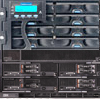 |
A torrent of data Big data is coming to light source facilities across the globe, and CHESS is no exception. In preparation for the need to collect, analyze, and archive up to 100 terabytes of data per year, CHESS has launched an initiative to upgrade its computing infrastructure, drawing on the host laboratory's decades-long experience with operating high-energy physics experiments. more » |
The Cornell High Energy Synchrotron Source (CHESS), a national user facility, is supported by the National Science Foundation and the National Institutes of Health/National Institute of General Medical Sciences under NSF award DMR-0936384. CHESS is operated and managed for the National Science Foundation by Cornell University. |
| © 2014 CHESS. All Rights Reserved. |
